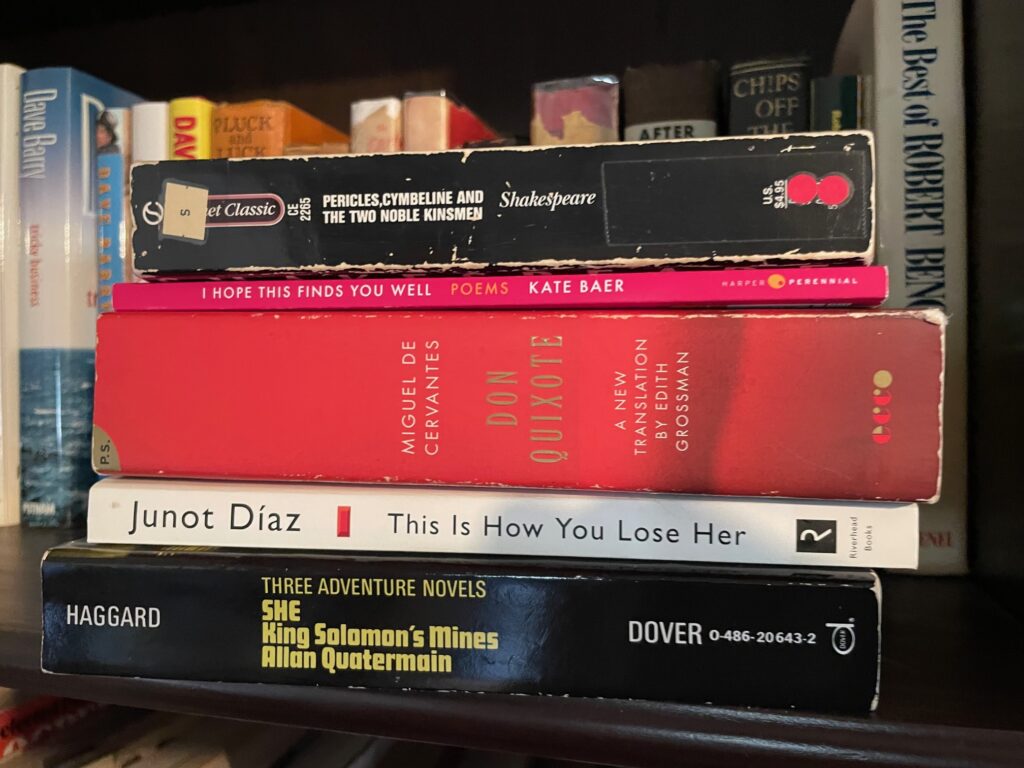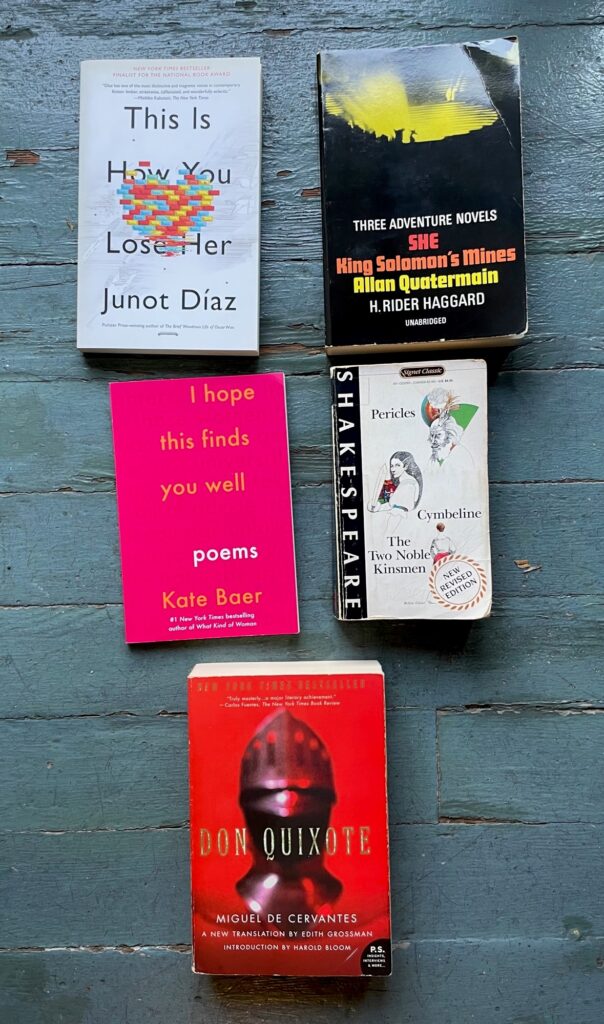Books acquired: “A Place at the Nayarit,” Natalia Molina; “Waste Tide,” Chen Qiufan; “I Hope This Finds You Well,” Kate Baer; “The Call of Cthulhu and Other Weird Stories,” H.P. Lovecraft
Books read: “Allan Quatermain,” H. Rider Haggard; “Don Quixote,” Miguel de Cervantes; “I Hope This Finds You Well,” Kate Baer; “Cymbeline,” “The Two Noble Kinsmen,” William Shakespeare; “This is How You Lose Her,” Junot Diaz
As 2022 races to a close, here’s my penultimate Reading Log for the year. Somehow — I’ll explain how — I managed to finish not only a doorstop, but five books more. Allow me to recap.
“Quatermain” (1887): Yes, the quest for a “great white race” rumored to be in a remote part of Africa is risible, and a stretch in the middle about the customs, art and architecture of the Zu-Vendi people is recommended to insomniacs. But mostly this adventure story — a direct sequel to “King Solomon’s Mines” — trots along, and in telling it Haggard has a lot to say about loyalty, bravery, love, male friendship and aging. This is nonsense at a very high level. It’s the third and final novel in an omnibus bought in 2008 at St. Louis’ Patten’s Books. Mostly I listened to a very well done audiobook with one man adopting many British accents and creating clearly differentiated characters.
“Don Quixote” (1615): Up until this point, I considered “Moby-Dick” the greatest novel I’d read, and maybe it still is. Or is that “Don Quixote”? It’s certainly a lot funnier. A thorough delight: playful, nimble, mocking, thoughtful, metafictional, consistently hilarious. Far better than I’d dreamed. I wrote a column about reading it. I bought the Penguin translation in 2003 at B&N and, nearly two decades later, started it in mid-October 2022 before switching to the Edith Grossman translation, bought in 2011 at Borders during its closing sale. Mostly I liked the physical feel of the Grossman paperback, but it also seemed to take fewer liberties, and I liked that the footnotes were at the bottom of each page rather than at the back as in the Penguin.
“Finds You Well” (2021): Others’ words are on the left hand page, with the erasure poems (using only select words from the text on the left) on the right. Some of the originals are trollish comments or sales pitches directed to Baer. Others are supportive, and still others are misogynistic or hateful quotes taken from newspapers. Some of her erasures are cutting, others were so emotionally powerful they made me gasp or choke up, a few didn’t quite land for me. Overall, brilliant. Bought at San Francisco’s Green Apple Books on vacation earlier in the month after having clipped a positive review.
“Cymbeline” (1610): Said to be Tennyson’s favorite, but most of us will rate this in the middle of the pack. For one thing, the titular king isn’t very interesting, the play is scarcely about him and a surprising number of plot threads are only introduced in Act 3. However, Imogen is one of Shakespeare’s better women characters, and the last scene does a marvelous job of pulling all the strands together. Overall, enjoyable. Checked out from the Pomona Public Library.
“Two Noble Kinsmen” (1614): It’s believed Shakespeare wrote about half of this one, including the first and last acts, and John Fletcher the rest. Better than you might think for being part of the Shakespeare apocrypha; the scene where besties Arcite and Palamon politely help each other on with their armor before their duel has an Alphonse-and-Gaston flair, for instance, and I didn’t see the ending coming. Marginal, but not bad. Included in the copy above from the library.
“Lose Her” (2010): I listened to the audiobook. Its streetwise language and rhythms benefit from Diaz’s reading; he knows a lot about flow and punching up jokes. These linked stories can be funny, can be affecting, can disarm you, but to be honest, they are too earthy and vulgar for my taste. It’s possible that listening to the audiobook version, with Diaz’s voice in my ears, emphasized aspects that would have been easier to glide over on the page. Paperback bought at a 2017 appearance by the author at Scripps College. My copy is signed.
As you can see, of my six, two were plays that took about five days each to read, two were listened to as audiobooks and one was a poetry collection weighing in at 81 pages. As mentioned last month, I got October’s books out of the way early to get a running start on “Don Quixote,” which I wrapped up after 40 (!) straight days of reading. It would have made a month on its own and no one would have begrudged me, not least myself. Nice to knock off five more, though!
What did you read in November, everyone? And have you read, or attempted to read, “Don Quixote”? Let us know in the comments.
Do you have certain books you want to read before 2022 ends, for whatever reason? There are two or three dozen books I’d have liked to have gotten to this year, and in some cases I would never have guessed I wouldn’t get to them — while being surprised at some I did get to. I may end up with another six-book month in December and as for the thrust of what I want to accomplish, you’ll find that below.
Next month: The last three Shakespeare plays (I hope!) that I haven’t read.


